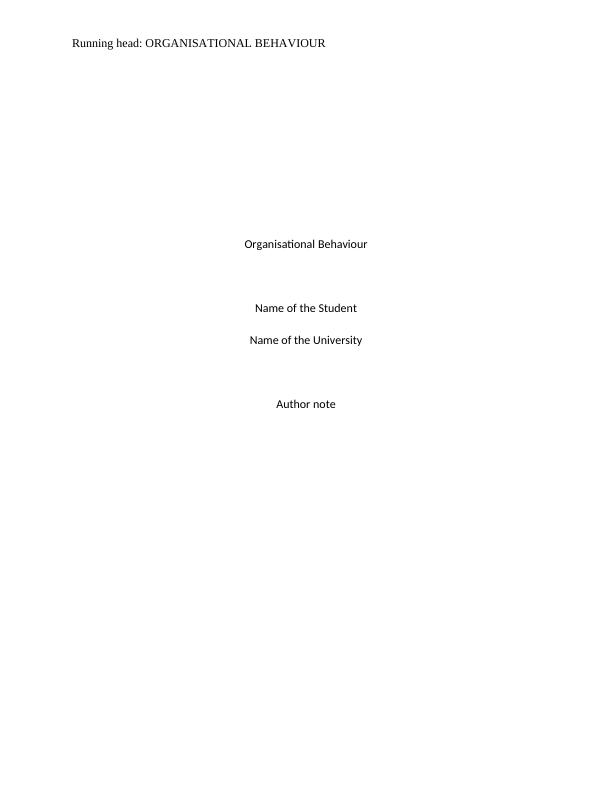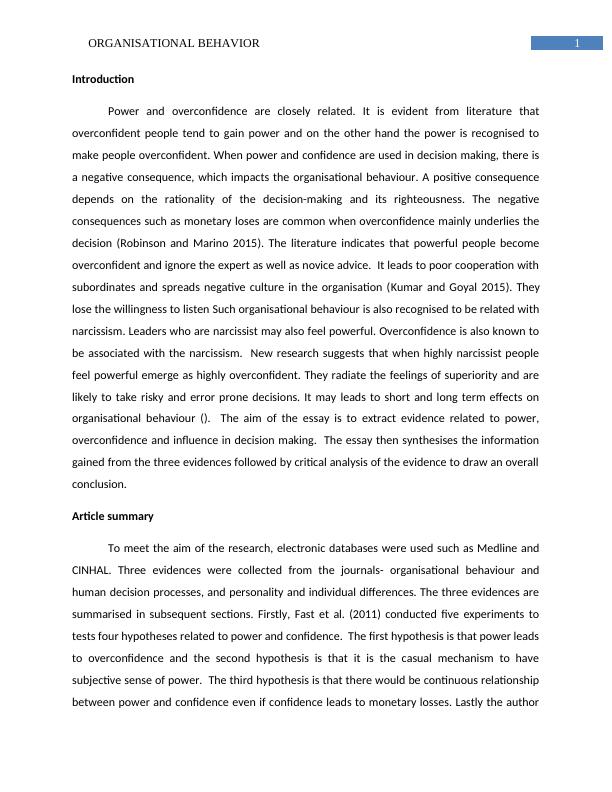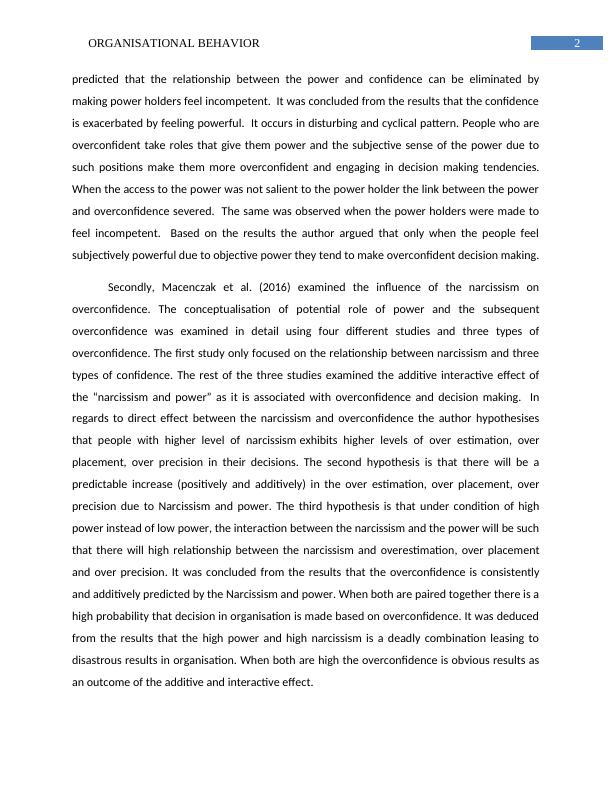Power and Overconfident Decision-Making - Doc
8 Pages2729 Words42 Views
Added on 2021-06-18
Power and Overconfident Decision-Making - Doc
Added on 2021-06-18
ShareRelated Documents
Running head: ORGANISATIONAL BEHAVIOUROrganisational BehaviourName of the StudentName of the UniversityAuthor note

1ORGANISATIONAL BEHAVIORIntroduction Power and overconfidence are closely related. It is evident from literature thatoverconfident people tend to gain power and on the other hand the power is recognised tomake people overconfident. When power and confidence are used in decision making, there isa negative consequence, which impacts the organisational behaviour. A positive consequencedepends on the rationality of the decision-making and its righteousness. The negativeconsequences such as monetary loses are common when overconfidence mainly underlies thedecision (Robinson and Marino 2015). The literature indicates that powerful people becomeoverconfident and ignore the expert as well as novice advice. It leads to poor cooperation withsubordinates and spreads negative culture in the organisation (Kumar and Goyal 2015). Theylose the willingness to listen Such organisational behaviour is also recognised to be related withnarcissism. Leaders who are narcissist may also feel powerful. Overconfidence is also known tobe associated with the narcissism. New research suggests that when highly narcissist peoplefeel powerful emerge as highly overconfident. They radiate the feelings of superiority and arelikely to take risky and error prone decisions. It may leads to short and long term effects onorganisational behaviour (). The aim of the essay is to extract evidence related to power,overconfidence and influence in decision making. The essay then synthesises the informationgained from the three evidences followed by critical analysis of the evidence to draw an overallconclusion. Article summary To meet the aim of the research, electronic databases were used such as Medline andCINHAL. Three evidences were collected from the journals- organisational behaviour andhuman decision processes, and personality and individual differences. The three evidences aresummarised in subsequent sections. Firstly, Fast et al. (2011) conducted five experiments totests four hypotheses related to power and confidence. The first hypothesis is that power leadsto overconfidence and the second hypothesis is that it is the casual mechanism to havesubjective sense of power. The third hypothesis is that there would be continuous relationshipbetween power and confidence even if confidence leads to monetary losses. Lastly the author

2ORGANISATIONAL BEHAVIORpredicted that the relationship between the power and confidence can be eliminated bymaking power holders feel incompetent. It was concluded from the results that the confidenceis exacerbated by feeling powerful. It occurs in disturbing and cyclical pattern. People who areoverconfident take roles that give them power and the subjective sense of the power due tosuch positions make them more overconfident and engaging in decision making tendencies.When the access to the power was not salient to the power holder the link between the powerand overconfidence severed. The same was observed when the power holders were made tofeel incompetent. Based on the results the author argued that only when the people feelsubjectively powerful due to objective power they tend to make overconfident decision making.Secondly, Macenczak et al. (2016) examined the influence of the narcissism onoverconfidence. The conceptualisation of potential role of power and the subsequentoverconfidence was examined in detail using four different studies and three types ofoverconfidence. The first study only focused on the relationship between narcissism and threetypes of confidence. The rest of the three studies examined the additive interactive effect ofthe “narcissism and power” as it is associated with overconfidence and decision making. Inregards to direct effect between the narcissism and overconfidence the author hypothesisesthat people with higher level of narcissismexhibits higher levels of over estimation, overplacement, over precision in their decisions. The second hypothesis is that there will be apredictable increase (positively and additively) in the over estimation, over placement, overprecision due to Narcissism and power. The third hypothesis is that under condition of highpower instead of low power, the interaction between the narcissism and the power will be suchthat there will high relationship between the narcissism and overestimation, over placementand over precision. It was concluded from the results that the overconfidence is consistentlyand additively predicted by the Narcissism and power. When both are paired together there is ahigh probability that decision in organisation is made based on overconfidence. It was deducedfrom the results that the high power and high narcissism is a deadly combination leasing todisastrous results in organisation. When both are high the overconfidence is obvious results asan outcome of the additive and interactive effect.

End of preview
Want to access all the pages? Upload your documents or become a member.
Related Documents
Organisational Behaviour: Analysis of Three Articleslg...
|12
|2907
|465
Power and overconfident decision-making Assignment PDFlg...
|7
|2456
|77
Power and Overconfidence Decision Makinglg...
|10
|2718
|113
Different Types of Biases Affecting Growth of Leaders in Businesslg...
|7
|1796
|85
Warren Buffet Leader with Laissez faire leadership styleslg...
|6
|772
|277
Interpersonal skills for Professionallg...
|8
|1234
|12
